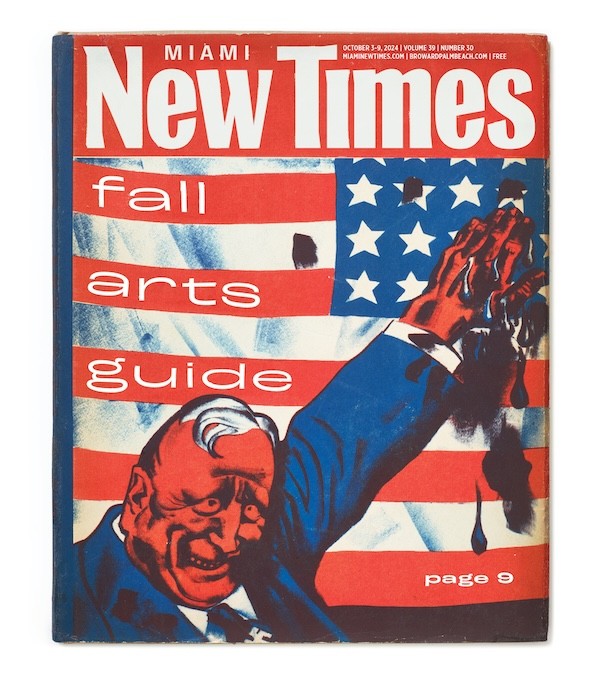Given the incredible success of his 2002 breakout album, El Abayarde, and the snatches of the 2004 followup El Enemy de los Guasíbiri blasting out of seemingly every car in Miami, it is not surprising that Tego should be the unofficial king of Miami Carnaval this year. Even though the official king and fellow Boricua Victor Manuelle has singles from his recently released Travesía (Journey) climbing the Latin Billboard chart, the chant that rings out throughout the day along Calle Ocho is not "Victor" but "Tego! Tego!"
There is a parable in the eclipse of the handsome white singer once known as the "salsero of the youth" (eleven years and ten albums into his solo career the thirtysomething is not so young anymore) by the funky, black, big-ass-Afro-wearing rapper. As the tale is always told, back in the day salsa was conscious: The Afro-Caribbean beats and the tough-guy lyrics of the late Sixties and early Seventies came from the mean streets of New York City, San Juan, Santo Domingo, Cali.... Then the major labels moved in and the beats got soft and the lyrics got sappy and the singers got pretty: Lalo Rodriguez, Jerry Rivera, Marc Anthony, Victor Manuelle. Salsa, purists pronounced, was dead.
Manuelle, at least, is still kicking. When the king holds court in the lobby of the Miami Airport Hilton a few days before the street festival he announces: "This is the best moment of my career commercially and artistically." Technically Manuelle is one of the best soneros on the scene. Not a disguised R&B singer like Marc Anthony, he excels at the art of improvising around a song's repeated chorus without ever losing the underlying beat called the clave. Yet the crooner's primary message is that man suffers for love; his repertoire is deliberately crafted to appeal to -- gasp! -- women. "Women buy records," the singer reveals. When Manuelle performs at the pre-Calle Ocho party at Bongo's Cuban Cafe hosted by Salsa 98 (WRTO-FM 98.3), fans in high heels and tight miniskirts sing along to the confession in his latest hit, "Tengo Ganas" ("I'm in the Mood"): I'm in the mood to fall in love again, but the memory of your body won't let me. They swoon as he closes the show with the perverse request from his classic "Pensamiento y Palabra" ("Thought and Word"): Do things to me tonight that will hurt me. The brass peals. The piano moans. The drums crash. The drama is delicious.
Yet for all the telenovela fun, the sentiment inspired by Manuelle's salsa is profoundly private. Nowhere in his pretty cries of pain is there any echo of the worsening unemployment or deteriorating living conditions among so many Puerto Ricans on the island and the U.S. mainland. Enter El Abayarde, the king of the fire ants, who earned his nickname as a kid for bugging everyone around him. El Abayarde doesn't sing, he drawls in the just-woke-up voice of a people ready to arise and claim their rightful place. The masses who swarm the Calle Ocho festival free of charge cannot wait to hear him. "Tego! Tego!" they chant, practically booing the pale Cuban Salsa 98 comics Los Fenomencos off the stage. "Tego! Tego!" they chant even during the set by Huey Dunbar, the singer with a kinky blond 'fro who with his former outfit DLG (Dark Latin Groove) helped open up the mainstream to urban Latin sounds and who today unleashes some of the most soul-stirring R&B ever heard. But his songs of love are still not telling the massive what it wants to hear. "Tego! Tego!"
Finally, here he is. Every skinny girlfriend is on the shoulders of every bulky boyfriend. View obstructed, true believers on the ground bitch and moan. A middle-age woman in a "Puerto Rico" baseball jersey attacks a cowbell. A brown-skinned teen with gothic gang letters inked across his shoulders perches on the palms of a group of friends, balancing precariously as he adjusts his head rag and replaces his baseball cap before diving into the roiling crowd. Mira quien llega. Cosa buena. El negro Calde' sin problema. Tego raps over a spooky synth, a snaky snare, and lead foot bass. Look who's here! ... The black Calde', no problem.
Legions of teens and preteens and even viejas grind. Don't be embarrassed because this African thing is for the ladies. This is black and street and good and nothing to be embarrassed about. This is happiness for your body without the Macarena, Tego promises. More and more fans squeeze through the opening in the fence that leads to the Bud Light stage, stuffing themselves inside the nooks and crannies of the already cramped crowd. Tens of thousands of bodies press together in ecstasy.
Then -- inevitably? -- a fight breaks out. A wide swath opens in front of the stage where just an instant before it seemed that not another inch of space could be found. Two bare-chested young men circle each other in the ancient ritual of machismo. Fans jeer and wave their hands, demanding the fight break up. Amazingly, it does. The guapos calm down even before Tego can stop the track and implore his fans to behave. Maybe they feel the same way Tego does. "It's an honor to be here," the rapper said between songs only minutes before. He's been known to break down in tears talking about how proud his parents are now that he's shared the stage with some of Puerto Rico's most respected salsa stars. It isn't that the black Calde' made it despite the fact that he's poor and street and black; he made it because he's all those things. Cosa Buena. What could be more disgraceful now than to disrupt the "largest Hispanic festival in the United States" with a fan riot? El Abayarde can't let that happen. So he closes the show with the sinuous Middle Eastern riddim of his hit "Guasa, Guasa" ("Badass"), leaving his subjects with a command. If you're going to shoot someone, he raps, shoot me.











